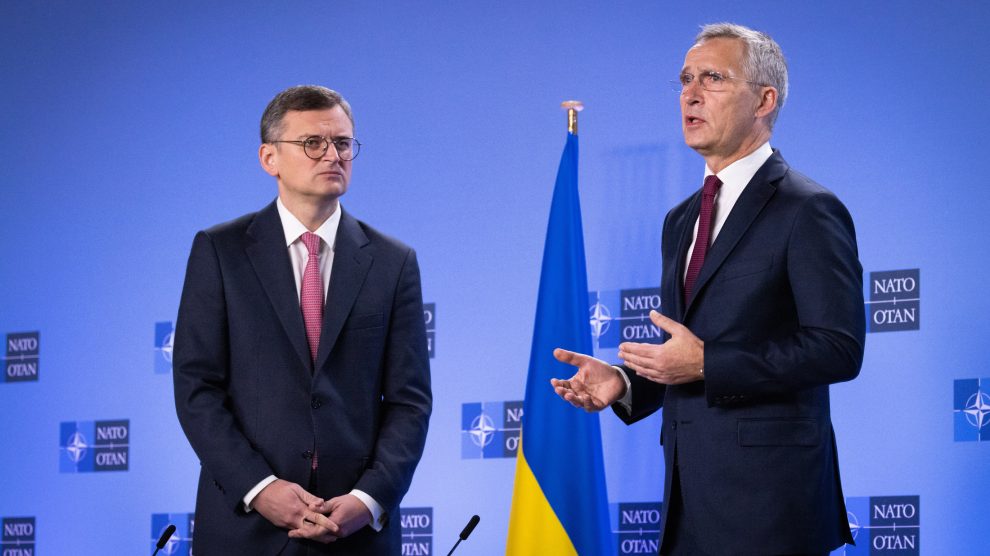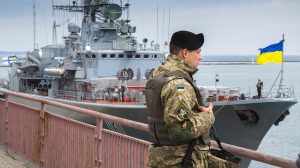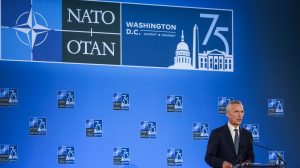Catch up quickly with the stories from Central and Eastern Europe that matter.
Russia’s war on Ukraine
Russia has built up a large stockpile of missiles and intends to use them in a bid to destroy Ukraine’s power and heating infrastructure in the coming months, NATO’s secretary-general warned this week.
With the front line largely frozen after Ukraine’s autumn counteroffensive failed to make significant gains, Kyiv has stepped up calls for more air defence supplies from its western allies as it girds for another winter bombardment.
“Russia has amassed a large missile stockpile ahead of winter, and we see new attempts to strike Ukraine’s power grid and energy infrastructure, trying to leave Ukraine in the dark and cold,” NATO Secretary-General Jens Stoltenberg (pictured above with Ukraine’s Foreign Minister Dmytro Kuleba) told reporters in Brussels on Wednesday.
“We must not underestimate Russia. Russia’s economy is on a war footing,” he said following a meeting of allied foreign ministers and their Ukrainian counterpart.
The warning from the head of the US-led military alliance, which Ukraine has applied to join, comes as EU countries and US lawmakers continue to squabble over respective new financial support packages for Kyiv proposed by Brussels and the White House, raising questions on the longevity of western backing as Russia’s invasion grinds on.
Antony Blinken, US secretary of state, said he saw “no sense of fatigue” among NATO members regarding support for Ukraine.
The European Council president, Charles Michel, called on Thursday for a defence union, underscoring the need to both continue supporting Ukraine and ensuring Europe’s own security.
Speaking at a defence conference, Michel said “the time has come to create a real union of defence coupled with a true defence single market”.
He added Europe should focus on two goals: “First, our support – our ironclad military support for the people of Ukraine – because Ukraine security is our security, it is all of our security.
“And second, I repeat again, we must make our defence – our European defence – stronger now, tomorrow and in the future.”
And while noting Europe’s unprecedented assistance to Ukraine, Michel stressed more needs to be done.
“We all know that we need to do more—more missiles, more ammunition, more air defence systems and faster. And it’s an obligation—an obligation toward the Ukrainian people, but also towards our citizens. By protecting Ukraine, we protect ourselves, and our continued strong military support also sends a signal to our partners, especially our American allies—a clear signal that we take our security more seriously than ever.”
Michel also called for more effective coordination of European defence spending, as well as a greater role for the European Defence Agency and ramping up financing for the defence industry.
Slovak truckers will block the main border crossing with Ukraine from December 1, the country’s truckers association UNAS said, joining Polish protests against Ukrainian drivers.
Polish truckers have been blocking several crossings with Ukraine since November 6 to demand tougher conditions for Ukrainian peers.
Polish and Slovak truckers complain Ukrainian truckers offer cheaper prices for their services and also transport goods within the European Union, rather than just between the bloc and Ukraine.
Slovak drivers staged a symbolic protest earlier this month but will begin their blockade at the Vysne Nemecke/Uzhhorod crossing from 3pm on Friday.
“The purpose of the protest is to join truck carriers from Poland,” UNAS said in a statement on its Facebook page on Wednesday. “We cannot leave them alone in the fight.”
They say their business has been undercut since truckers from Ukraine gained exemptions from seeking permits to cross following Russia’s invasion of Ukraine in February 2022.
Vysne Nemecke is the only crossing on the Slovakia-Ukraine border open to heavy trucks. UNAS said its blockade would not restrict humanitarian aid, military support or fuel and chilled food deliveries.
Other news from the region
Poland’s president on Monday swore in members of a government that will likely only last two weeks, in what opposition parties say is a “farce” intended to delay them from taking power. The Law and Justice (PiS) party, in power since 2015, came first in an October election but fell well short of the 231 seats needed for a majority and appears unlikely to win a vote of confidence. A broad alliance of pro-EU parties, led by Civic Platform leader Donald Tusk, secured 248 seats but nevertheless PiS ally President Andrzej Duda gave Prime Minister Mateusz Morawiecki the first shot at doing so.
Estonia, Latvia, Lithuania, Poland, Romania and Ukraine are boycotting this week’s meeting of the Organisation for Security and Cooperation in Europe, or OSCE, after it became clear the Russian foreign minister would be attending. Foreign ministers from the five countries made their announcement on Tuesday after Russian foreign minister Sergei Lavrov said he planned to attend the meeting in the North Macedonian capital of Skopje. In a joint statement, the Baltic officials said that Lavrov’s attendance “risks legitimising the aggressor Russia as a full member of our community of free nations”.
Azerbaijani President Ilham Aliyev told US Secretary of State Antony Blinken in a call on Monday that recent American actions in support of Armenia had jeopardised US-Azerbaijani ties, Baku said on Tuesday. The two countries had enjoyed relatively cordial relations until Azerbaijani forces recaptured the largely ethnic Armenian-populated breakaway region of Nagorno-Karabakh in a lightning offensive in September. The US provided diplomatic backing for Armenia, which had supported Karabakh’s separatist authorities, and U.S. officials visited Yerevan in the days after the offensive.
China has dropped trade measures targeting Lithuania that amounted to “coercion” as the two governments gradually move toward restoring diplomatic relations, the Baltic nation’s top diplomat said this week. A regime of practices that was challenged at the World Trade Organisation, including China effectively halting imports, “is over,” Lithuanian Foreign Minister Gabrielius Landsbergis told Bloomberg in an interview on Monday. Lithuania became embroiled in a dispute with China in 2021 after allowing Taiwan to set up a representative office under the island’s name.
Critics of Serbia’s nationalist government who have documented the country’s endemic corruption were targeted with military-grade spyware earlier this year, according to new findings by security researchers. The attempted hacking of two Serbian pro-democracy activists – who have asked not to be named to protect their safety – was ultimately not successful because both individuals’ Apple iPhones had been updated with the latest iOS software, which the researchers said protected the devices from being infiltrated.
Several members of an opposition party in Kosovo were arrested on Wednesday during a protest in Prishtina against a special war crimes court in The Hague that is prosecuting former Kosovar leaders over crimes committed during the 1998-99 war against Serbia. Six members of the Social Democratic Party (PSD), which is not represented in parliament, were arrested and ordered detained for 48 hours by the prosecutor’s office, PSD said, adding that its chairman, Dardan Molliqaj, was among those arrested. PSD said the detention of its members was unfair and an attempt to silence the opposition.
Romania has yet to present credible measures to offset the budget impact of planned pension hikes, Standard & Poor’s said this week, warning that the country’s deficit could remain high for the foreseeable future. Romania passed legislation last week under a framework agreed with the EU in exchange for recovery funds to put its pension system on a sustainable path. The measures are aimed at eliminating inconsistencies in the way state pensions are calculated and include a gradual increase in the retirement age, the indexation of pensions to inflation, and another big hike from September.
A fire in a hostel in the centre of Almaty, Kazakhstan’s largest city, killed 13 people, authorities said early on Thursday. Almaty Mayor Erbolat Dosaev said that among the dead were several foreigners, and Almaty police later clarified that nine of the victims were Kazakh citizens, while the other four were foreigners—two Russian citizens, including one from the Far Eastern Sakha region, and two citizens of Uzbekistan. Emergency services said there were 72 people, many of them foreigners, in the hostel, which occupies the ground floor and the basement of a three-story building.
Unlike many news and information platforms, Emerging Europe is free to read, and always will be. There is no paywall here. We are independent, not affiliated with nor representing any political party or business organisation. We want the very best for emerging Europe, nothing more, nothing less. Your support will help us continue to spread the word about this amazing region.
You can contribute here. Thank you.







Add Comment